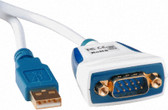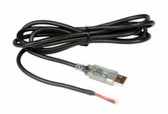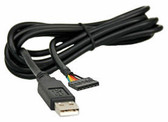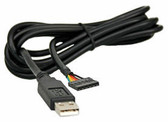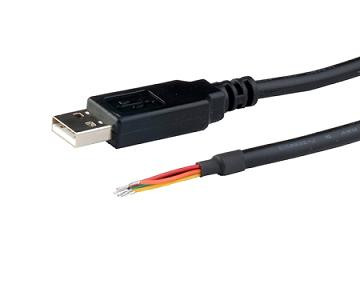 Loading... Please wait...
Loading... Please wait...Currency Displayed in
- Home
- Wired Comms
- USB
- USB Converter Cables
- FTDI TTL-232R-5V-WE USB to Serial TTL Converter Cable
Categories
FTDI TTL-232R-5V-WE USB to Serial TTL Converter Cable
FTDI
Product Description
| Part Number |
Description |
End Connector |
Cable Details |
| TTL-232R-5V-WE |
USB to UART interface cable with +5V TTL level UART signals |
Wire Ended (no connector) |
6 core, UL2464 24 AWG, diameter=5mm |
The TTL-232R cables are a family of USB to TTL serial UART converter cables incorporating FTDI’s FT232RQ USB to Serial UART interface IC device which handles all the USB signalling and protocols. The cables provide a fast, simple way to connect devices with a TTL level serial interface to USB.
Each TTL-232R cable contains a small internal electronic circuit board, utilising the FT232R, which is encapsulated into the USB connector end of the cable. The FT232R datasheet, DS_FT232R, is available at http://www.ftdichip.com. The other end of the cable comes with a selection of different connectors supporting various applications.
Cables are FCC, CE, RoHS compliant and are available at TTL levels of +5V and +3.3V.
Cables are available with either a 6-way SIL,0.1” pitch connector, a 3.5mm Audio Jack, an 8 way, keyed 2mm pitch connector (intended for use with VMUSIC2 or VDRIVE2) or bare, tinned wire ended connections.
The USB side of the cable is USB powered and USB 2.0 full speed compatible. Each cable is 1.8m long and supports a data transfer rate up to 3 Mbaud. Each cable supports the FTDIChip-ID™, with a unique USB serial number programmed into the FT232R. This feature can be used to create a security or password protected file transfer access using the cable. Further information and examples on this feature are available at http://www.ftdichip.com under FTDIChip-ID Projects.
The TTL-232R cables require USB drivers, available free from http://www.ftdichip.com, which are used to make the FT232R in the cable appear as a virtual COM port (VCP). This then allows the user to communicate with the USB interface via a standard PC serial emulation port (for example TTY). Another FTDI USB driver, the D2XX driver, can also be used with application software to directly access the FT232R on the cable though a DLL.






